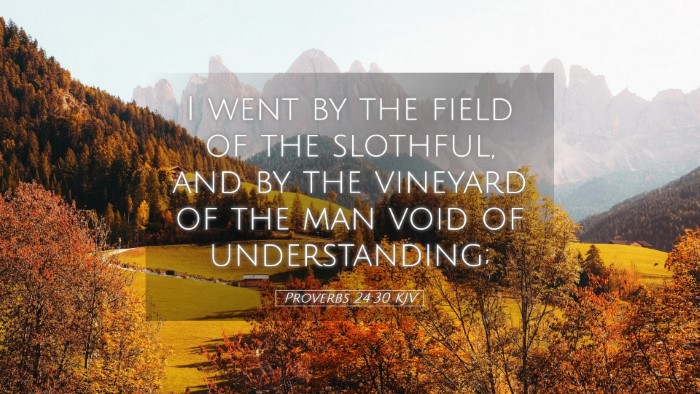Commentary on Proverbs 24:30
Verse Text: "I went by the field of the slothful, and by the vineyard of the man void of understanding."
Introduction
The book of Proverbs is a rich compilation of wisdom sayings that emphasizes moral and ethical conduct in life. Proverbs 24:30 serves as a succinct but profound observation that reveals the consequences of laziness coupled with a lack of understanding. This commentary synthesizes insights from respected public domain commentaries, including those by Matthew Henry, Albert Barnes, and Adam Clarke, to illuminate the meaning and implications of this verse.
Contextual Analysis
This verse is set within a section that contrasts the wise and the foolish, encouraging diligence and discernment. The imagery of a field and vineyard evokes agricultural life common in ancient Israel, which many would understand familiarly. The negligence indicated in this verse serves not only as a warning but also as a teaching moment about the state of the soul and the importance of diligence.
Matthew Henry’s Insights
Henry provides a pastoral lens for understanding this verse, noting that the "field of the slothful" symbolizes the consequences of idleness. He emphasizes that laziness leads to ruin, which is typified by an overgrown and unproductive vineyard. Henry points out that this provides a reflection on spiritual neglect—just as fields that are left untended become wild, so too do our lives become unruly without the cultivation of wisdom and diligence.
Albert Barnes’ Reflections
Barnes elaborates on the implications of the verse, suggesting that the observation made serves as an admonition to the readers about spiritual and practical responsibilities. He indicates that "the man void of understanding" is one who fails to grasp the importance of working proactively. Barnes concludes that this verse metaphorically communicates the spiritual decay that results from inactivity—highlighting that a lack of understanding leads to a chaotic state in both one's material and spiritual life.
Adam Clarke’s Commentary
Clarke expands upon the moral implications of the verse. He notes that the "field of the slothful" represents not just physical idleness but a spiritual lethargy that impacts one's relationship with God. Clarke emphasizes that neglecting one's responsibilities can lead to a loss of spiritual insight and understanding. He frames this verse as a call to vigilance in all aspects of life, particularly in spiritual endeavors where diligence and commitment are essential to growth and understanding.
Theological Implications
The theological underpinnings of this verse can be examined through the lens of stewardship and accountability. It underscores the idea that believers have a responsibility to cultivate their lives and talents. The metaphorical neglect seen in the verse serves as a warning not just regarding material possessions but also concerning the gifts and grace provided by God.
Stewardship of Resources
All three commentators highlight that the neglect of the field and vineyard represents a failure to steward resources wisely. This transcends economic implications and calls upon believers to actively engage in their spiritual lives. The lesson is clear: to avoid the outcomes of the slothful, one must be diligent in nurturing both material provisions and spiritual foundations.
Practical Applications
Understanding Proverbs 24:30 leads to several important applications for pastors, students, theologians, and Bible scholars:
- Personal Reflection: Individuals are challenged to assess their own lives—are there areas left untended that require faithfulness and diligence?
- Teaching Opportunities: Pastors can utilize this verse to instruct congregations about the necessity of an active faith, applying the principles of diligence not only in daily life but also in spiritual growth.
- Accountability Structures: This verse could inspire small groups or accountability partners to encourage one another in their Christian walk, preventing spiritual stagnation.
- Curriculum Development: Thematic resources can be created to help believers recognize the importance of spiritual cultivation alongside physical responsibilities.
Conclusion
Proverbs 24:30 serves as a poignant reminder of the consequences of laziness and lack of understanding in both practical and spiritual domains. By considering the insights of Matthew Henry, Albert Barnes, and Adam Clarke, we gain a fuller picture of how this verse speaks across time and culture, offering wisdom that is crucial for both individual believers and the church as a whole. We are encouraged to cultivate our spiritual fields diligently, ensuring that we bear fruit in our lives and in our communities.


